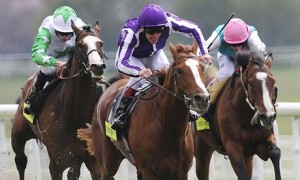

To be successful at horse racing betting you really need a combination of knowledge and skills. A basic understanding of odds is essential, and you need to understand the concept of value and know how to find it. You should also be familiar with all the different wagers that you can place. Good discipline is vital as well, especially in terms of managing your money properly.
Of course, you also need to be able to pick winners. You don’t necessarily have to be an expert on horse racing to make some money out of betting on it but you really do need to know how to estimate a horse’s chance of winning a race. You’ll never get it right all the time, no matter how good you are, though you can increase your likelihood of winning if you know what to look for.
There are no hard and fast rules about how to rate a horse’s chance in any particular race and if you end up betting for a good length of time then you’ll probably develop your own strategies based on your own experiences. However, there are certain basics that it helps to be aware of and a few guidelines that it pays to stick to. We’ve covered these in some detail below.
We should mention that you don’t have to get involved with studying form guides and carrying out detailed research to enjoy betting on horse racing. Lots of people have a great deal of fun just picking horses based on things such as liking a horse’s name. There’s nothing at all wrong with making your selections this way and you may even get lucky more often than not. It’s only if you’re serious about trying to consistently make money that you need to really put some thought into your selections.
The first thing to remember when betting on horse racing is that anything can happen. The favorite doesn’t win every time, even if they are considerably better than the rest of the field. In fact, on average the favorite only wins in horse racing approximately 30%. This is largely what makes horse racing betting so much fun – outsiders can and do win and often at very good odds. In theory at least, any horse can win any race.
The ultimate key to success is not in working out which horse is most likely to win but in finding horses that are more likely to win than the odds suggest. This is what value betting is all about; backing a horse when the odds are longer than they technically should be. Bookmakers are not perfect when it comes to setting odds and there are frequent opportunities for making good value bets. If you can spot the opportunities often enough then you’ll almost certainly make money in the long run.
The difficult bit, though, is in actually working out how likely a horse is to win. There are many different approaches you can take in this respect but there is, unfortunately, no exact science involved. There are simply too many factors and too many unknowns to make anything other than an approximation. There’s no reason why you can’t make reasonably accurate approximations though.
To work out the chances of a horse winning a race, there are a number of factors that you have to consider. The more information you take into account the more likely you are to make an accurate assessment.
Every single race is different in some respect, and a horse that’s very likely to win one particular race may very well have little to no chance in another race two weeks later. You need to treat every single race as a separate event and carry out your analysis accordingly. It’s not just about determining the quality of each horse as you also need to compare its quality to that of its opposition. You need to think about form, conditions, track suitability and all kinds of other things.
Before we get on to the details of the various factors that you should be looking at there is one thing we should stress. A lot of people, even some experts, would have you believe there are certain rules that you should stick to no matter what. Common advice is that you should never back a horse that’s racing at a track where its trainer or jockey has a poor record, or you should never back one that is not suited to the current track conditions.
We don’t believe it’s correct to talk in such absolutes. The record of a trainer and jockey at a particular track is definitely something to consider, as is a horse’s record in particular track conditions. However, that is all they are – something to consider. You need to take that information on board along with everything else that you know, and then try and make some kind of educated judgment. It’s rare that you should dismiss a horse’s chances purely on one or two factors alone. Equally, you should never really back a horse on just one or two factors either.
The following is a list of the main factors that you want to be looking at and taking into consideration, although not all of them will apply to every single race. These are in no particular order and this is not an exhaustive list, it’s simply a guide to the kind of things you should be thinking about.
- Current form of horse
- Overall form of horse
- Current form of trainer
- Current form of jockey
- Course record (of horse, trainer and jockey)
- Distance record
- Speed rating
- Conditions
- Weight carried
- Class
- Fitness
- Expected pace of race
Most of the information you need to carry out the necessary analysis can be found in a form guide. There are also plenty of websites that contain detailed records of horses, trainers and jockeys and their previous records. It doesn’t take all that long to compile all the information you need and it can prove to be time well spent.
The current form of a horse is often one of the first things people look at. This is certainly a very good indicator as it’s reasonable to expect a horse that’s in very good form to continue performing well. You have to consider current form in the context of overall form too though. Recent form can only tell you so much as the last couple of results could be anomalies.
When looking at the form of a horse you need to consider more than just the results. You should be looking at all the relevant aspects. For example, the quality of the opposition in previous races, the distance of those races, and what the conditions were in those races. You then need to compare those elements against those of the race you are betting on. If a horse has run well in similar conditions, over similar distances and against
a similar standard of opposition then this is obviously a good sign.
The current form of trainers and jockeys is often overlooked but it really shouldn’t be. While not as important as the form of the horse itself, the recent performances of trainers and jockeys should definitely be taken into account. They are important individuals in the success, or otherwise, of a horse and their influence should not be underestimated.
The course records of a horse, its trainer, and its jockey are well worth checking. It’s quite common for horses to run well at certain courses and not so well at others. Jockeys often ride more winners at certain courses too, and some trainers also seem to regularly do well at particular courses. The actual reasons for why performances differ from course to course are not really that important, you should just recognize if the course appears to be an advantage or a disadvantage for a potential selection.
The distance of a race is relevant for similar reasons to the above. Horses often have a preferred distance, or range of distances, so again this is something that you really need to look into. If a horse has a strong record over a
similar distance to the race you’re looking to bet on then that’s a big positive. Something else to look for is when a horse is stepping up in distance. You should check to see if it has a good record for finishing strongly in previous shorter races, as this can be a sign that it’s likely to be suited to a longer distance.
Basically you should check all the strengths and weaknesses of a horse and determine how they may affect its chances in a race, while looking at all the other factors that could influence the outcome.
In summary, that’s exactly what analyzing the form of a horse is all about. Essentially you want to collect all the relevant information and see how it applies to whatever race you’re looking to bet on. Only then can you make a truly informed estimate of a horse’s chances of winning. By carrying out the analysis on all of the horses running, you can make reasonably accurate assessments on each of their chances and then bet accordingly.
Always remember that there is no single correct way to pick your selections. We’ve provided some insight into the kind of things that we think you should be looking at and this is an excellent starting point. There may well be other factors that you want to look at instead of, or in addition to, the ones listed here though.
As you spend more time on horse racing betting you may well find that some statistics are far more relevant than others. This is where experience really starts to count, as you can fine tune your evaluations based on your own skills and understanding and develop your own systems and strategies according to what works the best for you. Good records will help with this so it really does pay to keep accurate and detailed records.
Something else to bear in mind is that you can maximize your potential returns by always trying to get the best possible odds for all your selections. The simplest way to do this is to have accounts with a few different online betting sites. You can then easily compare which one has the best odds every time you want to place a wager.
You should also remember that you don’t always have to bet on a race. The most successful horse racing bettors are very selective in when they place wagers. They may well do all the necessary analysis for a large number of races, but they will only put their money down when there is value to be had and a good reason to back their selection. That’s a very good general rule to follow.
